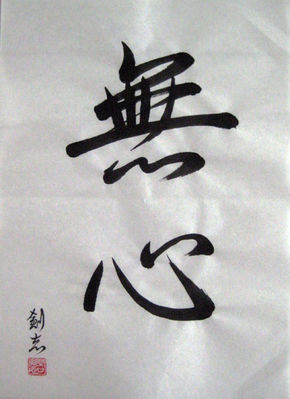 |
| Mushin. |
When he finally learned to admit it that he didn't know everything, my friend said, he felt, well, enlightened. At least liberated.
I've been reading about Japanese calligraphy, and I'm playing with the idea mastering it is somewhat akin to "I don't know." The masters of this art, or shodō, are said to seek a "no mind state" before they pick up the brush
To write Zen calligraphy with mastery, one must clear one's mind and let the letters flow out of themselves, not practice and make a tremendous effort. This state of mind was called the muslin ("no mind state") by the Japanese philosopher Nishida Kitaro. It is based on the principles of Zen Buddhism, which stresses a connection to the spiritual rather than the physical.Here is more on mushin.
The term is shortened from mushin no shin, a Zen expression meaning the mind without mind and is also referred to as the state of "no-mindness". That is, a mind not fixed or occupied by thought or emotion and thus open to everything.
Mushin is achieved when a person's mind is free from thoughts of anger, fear, or ego during combat or everyday life. There is an absence of discursive thought and judgment, so the person is totally free to act and react without hesitation and without disturbance from such thoughts. At this point, a person relies not on what they think should be the next move, but what is felt intuitively.I hesitate to attempt an application of this concept, especially to the matter of fact world of business writing. That would seem to violate the principle.
However, these thoughts arise, particularly for the business of thought leadership.
1. We all carry around a burden of beliefs and assumptions, and we aren't really aware of them. For example, do you assume that people act rationally? How does this influence your writing? Do you believe that capitalism is best when unfettered? How does this affect what you choose to write about?
2. If we wish to be genuine leaders of thought, we won't get there by repeating everything we think we know. We have to clear our minds of all that. We have to start afresh.
3. If we start from a position of humility -- I know very little -- we are more likely to arrive at a new insight, as opposed to a rearrangement of the thoughts of others. I guess I should be grateful for all I don't know.
Good writing is the fresh expression of a fresh idea. An empty mind seems a good starting point.
No comments:
Post a Comment